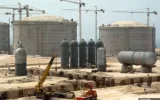Showy MoUs Have Grounded Iran LNG Project

According to an exclusive report by Energy Press, the Iran LNG project, with the promise of transforming Iran into a major player in the global liquefied natural gas market, was launched in the 1980s. The plan, which was to be implemented in cooperation with European companies such as Linde of Germany, Shell of the Netherlands, and Total of France, was plagued by incorrect technical studies from the beginning. Bijan Zangeneh, the then Minister of Oil, obtained permission from the Economic Council to invest millions of tons without carefully examining the saturated capacity of the global LNG market; a move that was even condemned by experts such as Gholamhossein Hassantash as “exorbitantly costly for the country.” Years later, during the Rouhani administration, negotiations began with Russian companies such as Gazprom to revive the project, but Russia itself was dependent on Western technology and could not help. This process has continued until now and with the current government, and after two decades, the fate of the project is still unclear. Recently, there was news that a memorandum of understanding was signed between two engineering and construction companies of the Petroleum Industries and the Iranian Natural Gas Liquefaction Company in order to provide a technical description of the work, supply of goods, and implementation and commissioning for the remaining works and completion of this project. At present, the detailed technical, financial, legal and contractual aspects effective in the implementation of the project are not precisely known. Experts consider its completion to be far from expected given the lack of technology and infrastructure for carrying out this project, and in this regard, an exclusive interview was conducted with Morteza Behrouzifar, an energy expert.
Memorandum of Understanding or Deception of the People?
In an exclusive interview with Energy Press about the memorandum of understanding between the Iranian Natural Gas Liquefaction Company and the Petroleum Industries Engineering and Construction Company, Morteza Behrouzifar said: The technology of liquefaction and the construction of LNG refineries is in the possession of very few companies in the world, mainly American and European. Even countries like Russia, which are advanced in the energy industry, depend on the West for this technology. In other words, there is practically no idea that even China or Russia can help us in this regard. Without the presence of Western companies, implementing such a project is almost impossible.
He added: At present, it is not clear on what basis a memorandum of understanding was signed for this project in Iran, because the necessary technical and technological conditions are basically not available. This project was defined in the past, during a period when cooperation with the West was possible, but it did not come to fruition. During the Ahmadinejad administration, it was decided to move the work forward quickly, and the initial infrastructure, such as ancillary facilities and a steam power plant, was built. However, real progress did not occur in the main part of gas liquefaction. According to claims, only about 20-25 percent of progress has been made, which is mostly related to ancillary parts, not the main technology.
The energy expert concluded: Without the cooperation of Western companies, especially American and some Europeans, the implementation of this project is unthinkable. Now that the space for negotiations between Iran and the US is open, perhaps if the sanctions are lifted, the project can be resumed by attracting capital and transferring technology. But if this connection is not established and we cannot cooperate with reputable global companies, any contract in this area will simply be a form of deception for the people.
From equipment that is rotting to lack of integrated management: a major setback against Qatar
Equipment purchased from the West is rotting in German warehouses due to sanctions. Managers promised that the project would be revived once the sanctions were lifted, but even after the JCPOA agreement, no Western company was willing to cooperate. On the other hand, incorrect planning in dividing the project into small, independent parts (EPC) caused the implementation to proceed uncoordinatedly. This unprofessional division disrupted integrated development and turned the project into a “dead end.” Currently, the completion of this project requires billions of dollars more, but the main problem is not only the provision of capital, but the lack of technology.
Managers claim that Iran’s first LNG exports will be realized within the next 6 months, but past experience shows that these promises are forgotten in the labyrinth of time and will not be fulfilled. While Iran is struggling in a quagmire of unfinished projects, Qatar—partner of the South Pars gas field—is a world record holder with 77 million tons of LNG produced per year and plans to increase its capacity to 126 million tons by 2027. This success is the result of long-term planning, the absorption of modern technology, and integrated management; something that unfortunately does not exist in Iran and among the companies in charge of this project.
Tags:LNG
- Comments sent by you will be published after approval by site administrators.
- Comments that contain slander will not be published.
- Comments that are not in Persian or not related to the news will not be published.

Comments
Total comments : 0 Awaiting review : 0 Date: 0